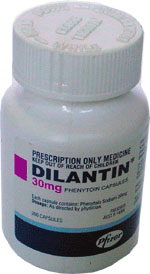Top Class Actions’s website and social media posts use affiliate links. If you make a purchase using such links, we may receive a commission, but it will not result in any additional charges to you. Please review our Affiliate Link Disclosure for more information.

To many doctors, and patients who suffer seizures, Dilantin is considered the tried and true treatment given its 60 year history. However, recent studies and reports have linked use of Dilantin with a high risk of contracting Stevens Johnson Syndrome (SJS), a severe skin condition that can lead to death.
There are currently more than 100 Dilantin SJS lawsuits filed by Dilantin users against pharmaceutical companies.
What is Stevens Johnson Syndrome (SJS)?
Stevens Johnson Syndrome (SJS) and a related disease, Toxic Epidermal Necrolysis (TEN), are life-threatening skin conditions. SJS and TEN occur as a result of an allergic reaction to certain prescription and over-the-counter medications. When a patient contracts SJS or TEN, their skin cells die and separate the epidermis from the dermis causing painful blistering of the skin and mucous membrane.
Victims of SJS or TEN suffer extreme pain and sensitivity. As a result, they must be hospitalized for weeks at a time for treatment and monitoring. In some cases, a victim may even die from resulting medical complications during SJS or TEN treatment.
According to the Stevens Johnson Syndrome Foundation, some symptoms of SJS include:
- Painful blistering of the skin and mucous membrane
- Preceded with flu like symptoms and high fever in many cases
- Sloughing off of skin
- Severe ocular (eye) conditions such as severe conjunctivis, iritis, palpebral edema, conjunctival and corneal blisters and erosions, and corneal perforation
Dilantin Side Effects
While any prescribed or over-the-counter medication can cause SJS and TEN, certain drugs have a high prevalence rate among SJS victims. Since 2008, there have been hundreds of cases documenting Dilantin users developing SJS after use of the anticonvulsant drug.
Aside from a risk of developing Steven Johnson Syndrome, Dilantin has also been associated with a high risk of fatal cardiovascular events. In addition to these two serious health conditions, the FDA has also identified other Dilantin side effects, including suicidal thoughts, aggressive behavior, mood changes and rash.
In general, Dilantin Stevens Johnson Syndrome lawsuits are filed individually by each plaintiff and are not class actions.
Do YOU have a legal claim? Fill out the form on this page now for a free, immediate, and confidential case evaluation. The attorneys who work with Top Class Actions will contact you if you qualify to let you know if an individual lawsuit or class action lawsuit is best for you. Hurry — statutes of limitations may apply.
ATTORNEY ADVERTISING
Top Class Actions is a Proud Member of the American Bar Association
LEGAL INFORMATION IS NOT LEGAL ADVICE
Top Class Actions Legal Statement
©2008 – 2024 Top Class Actions® LLC
Various Trademarks held by their respective owners
This website is not intended for viewing or usage by European Union citizens.
Get Help – It’s Free
Join a Free Dilantin Stevens Johnson Syndrome Class Action Lawsuit Investigation
If you or a loved one were diagnosed with Stevens Johnson Syndrome (SJS) or toxic epidermal necrolysis (TEN) after taking a prescribed or over-the-counter medication, you may be eligible to take legal action against the drug’s manufacturer. Filing an SJS lawsuit or class action lawsuit may help you obtain compensation for medical bills, pain and suffering, and other damages. Obtain a free and confidential review of your case by filling out the form below.
An attorney will contact you if you qualify to discuss the details of your potential case at no charge to you.
Oops! We could not locate your form.












